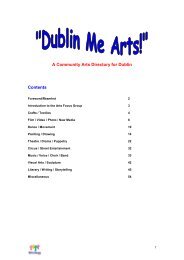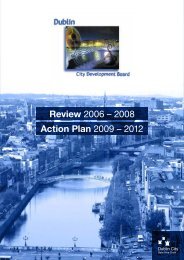A Dubliner's Guide to the Residential Tenancies Act 2004 ... - Dublin.ie
A Dubliner's Guide to the Residential Tenancies Act 2004 ... - Dublin.ie
A Dubliner's Guide to the Residential Tenancies Act 2004 ... - Dublin.ie
You also want an ePaper? Increase the reach of your titles
YUMPU automatically turns print PDFs into web optimized ePapers that Google loves.
My neighbours complain about <strong>the</strong><br />
volume of my music, what are my<br />
rights<br />
The <strong>Residential</strong> <strong>Tenanc<strong>ie</strong>s</strong> <strong>Act</strong> <strong>2004</strong><br />
places an obligation on tenants not <strong>to</strong><br />
behave within <strong>the</strong> dwelling or its<br />
vicinity in an anti-social manner. The<br />
definition of this includes engaging<br />
persistently in behaviour that prevents<br />
or interferes with <strong>the</strong> peaceful<br />
occupation of o<strong>the</strong>rs including tenants,<br />
neighbours and those in <strong>the</strong> vicinity of<br />
<strong>the</strong> dwelling. Repeated loud noise<br />
could see you given notice by your<br />
landlord or a referral <strong>to</strong> <strong>the</strong> PRTB.<br />
Therefore, it is best <strong>to</strong> seek a<br />
compromise on what is a reasonable<br />
level <strong>to</strong> play your music at that does<br />
not cause disturbance <strong>to</strong> neighbours.<br />
Can rent be rev<strong>ie</strong>wed more than<br />
once in a year<br />
The rent cannot be rev<strong>ie</strong>wed more<br />
frequently than once in <strong>the</strong> first 12<br />
months of a tenancy and once every<br />
12 months <strong>the</strong>reafter, unless <strong>the</strong>re has<br />
been substantial change in <strong>the</strong> nature<br />
of <strong>the</strong> dwelling.<br />
Under what circumstances might a<br />
landlord keep a deposit<br />
Under The <strong>Residential</strong> <strong>Tenanc<strong>ie</strong>s</strong> <strong>Act</strong><br />
<strong>2004</strong> <strong>the</strong> deposit must be promptly<br />
returned <strong>to</strong> <strong>the</strong> tenant unless <strong>the</strong>re is a<br />
default in <strong>the</strong> payment of rent or<br />
damage over and above normal wear<br />
and tear. Any disputes regarding<br />
deposit can be referred <strong>to</strong> <strong>the</strong> Private<br />
<strong>Residential</strong> <strong>Tenanc<strong>ie</strong>s</strong> Board dispute<br />
resolution service. An action will cost<br />
€25 and you do not need legal<br />
representation.<br />
Who decides <strong>the</strong> time for an<br />
inspection by a landlord<br />
Tenants have an obligation <strong>to</strong> allow<br />
<strong>the</strong> landlord, or a person acting on <strong>the</strong><br />
landlord’s behalf, access <strong>to</strong> carry out<br />
inspections at reasonable intervals.<br />
The date and time must however be<br />
agreed in advance with <strong>the</strong> tenant.<br />
There is no time period that a landlord<br />
must give. The tenant is not obliged <strong>to</strong><br />
be present for <strong>the</strong> inspection.<br />
Who is responsible for refuse<br />
charges – <strong>the</strong> tenant or landlord<br />
Generally in <strong>the</strong> <strong>Dublin</strong> City Council<br />
area, <strong>the</strong> bill will be addressed <strong>to</strong> <strong>the</strong><br />
occup<strong>ie</strong>r, in <strong>the</strong> case of a rented<br />
house. For apartment/flats it is usually<br />
addressed <strong>to</strong> <strong>the</strong> landlord. Ultimately<br />
<strong>the</strong>re is nothing <strong>to</strong> prevent a landlord<br />
passing this charge on <strong>to</strong> <strong>the</strong> tenant.<br />
Fur<strong>the</strong>r information can be obtained<br />
from <strong>Dublin</strong> City Council's website,<br />
www.dublincity.<strong>ie</strong>.<br />
What is <strong>the</strong> ‘rent a room scheme’<br />
And does <strong>the</strong> <strong>Act</strong> apply in this<br />
case<br />
The rent a room scheme allows<br />
landlords <strong>to</strong> rent a room(s) in <strong>the</strong>ir<br />
home and receive up <strong>to</strong> €10,000 (this<br />
works out at €192.31 per week) as<br />
rental income tax free. This income<br />
must be included in your tax return<br />
form at <strong>the</strong> end of <strong>the</strong> year. The<br />
person renting could also claim tax<br />
rel<strong>ie</strong>f. If you choose <strong>to</strong> avail of this<br />
scheme, it is a licence arrangement<br />
and landlord and tenant laws do not<br />
apply but it is recommended that a<br />
written agreement is prepared<br />
covering issues like <strong>the</strong> deposit, rent<br />
payments, notice periods and house<br />
roles. Fur<strong>the</strong>r information can be found<br />
on www.revenue.<strong>ie</strong> and<br />
www.oasis.gov.<strong>ie</strong>.<br />
A <strong>Dublin</strong>er’s <strong>Guide</strong> <strong>to</strong> <strong>the</strong> <strong>Residential</strong> <strong>Tenanc<strong>ie</strong>s</strong> <strong>Act</strong>, <strong>2004</strong> 27<br />
(Updated January 2008)
















